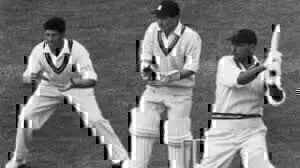
In 1959 Indian cricket had really touched rock bottom. During the home season of 1958-59 they lost the five Test series to the West Indies 3-0 and on the tour of England that followed they went down tamely in the first three Tests.
Already having lost the series, they were headed for a 5-0 whitewash and to make matters worse they had lost the services of one of their premier batsmen Vijay Manjrekar, who had to undergo a knee surgery. The mood then was dark and gloomy on the eve of the fourth Test at Manchester.
But a silver lining had been provided by the hundred notched up by Abbas Ali Baig in the match against Middlesex just before the Test commenced. Baig, a 20-year-old freshman at Oxford University, was not part of the original squad. He had been drafted following the injury to Manjrekar.
Straightaway, Baig displayed his prodigious talent while compiling that 102. Not unexpectedly he was included in the squad for the Old Trafford Test and while there was some excitement over his inclusion over the first three days it was clear that India were doomed to yet another defeat.
England had led off by getting 490 to which India's reply was a feeble 208. Inexplicably Colin Cowdrey captaining England for the first time did not enforce the follow on and the home side went on to make 265 for eight declared at stumps on the third day.
India were left to get 548 for victory or more realistically bat out two full days to avert what seemed a certain defeat. Baig who had scored 26 in the first innings batting at No 3 came in this time with the score 35 for one.
He settled down nicely making exquisite strokes all round the wicket and outscored the more experienced Nari Contractor with whom he added 109 runs for the second wicket. After Contractor was out for 56 skipper Dattajirao Gaekwad was out for a duck and at 146 for three he was joined by Polly Umrigar.
Baig had crossed his half century and was batting with confidence against the pace of Fred Trueman and Harold Rhodes and the spin of Ray Illingworth and John Mortimore. He continued to bat with aplomb and displayed youthful bravado in hooking the fast bowlers.
But with the total 173 and his own score 85 he was hit on the back of his head by a ball from Rhodes while essaying a hook. He retired for treatment. Chandu Borde who replaced him did not last very long but Umrigar and Bapu Nadkarni came in unbeaten at stumps with India 236 for four.
That India could bat out the whole day to save the Test didn't seem likely at this stage but all the same there was tremendous interest surrounding Baig. Could he get a 100 on Test debut was the question on the lips of every Indian cricket fan?
Nadkarni was out for 28 early on the final morning and with the score 243 for five Baig came out to join Umrigar. He showed no after effects of the injury and batted freely. Nor was he overawed by the fact that he was nearing a historic hundred. He sailed smoothly into the 90s, and on 96 he hooked Rhodes to the fence to keep his tryst with history.
The Old Trafford crowd rose to their feet and gave the young batsman a spontaneous round of applause. The press was handsome in their praise while noting that Baig had made his hundred on the same ground where the legendary Ranji had also started his Test career with a century way back in 1896.
Baig was hailed as a messiah who had come to the rescue of Indian cricket. Considering what the team had endured over the past year this was something to rejoice. Predictably, the match was lost. Baig had added 78 runs with Umrigar since returning to the crease but at 321 he was run out for 112.
Umrigar went on to notch up his only hundred in eight Tests in England and got 118 before he was ninth out. India were all out for 376 leaving England victors by 171 runs.
Baig did little of note in the final Test at the Oval which was also lost by an innings giving England a 5-0 clean sweep. But when he came to India for the 1959-60 Test series against Australia he found himself to be the most talked about cricketer in the land.
Indian fans longed to see the latest hero in action and Baig did not disappoint. After two low scores in the first Test at New Delhi he got a valuable 36 in the second Test at Kanpur before finishing with two half centuries in the third Test at Bombay.
In the first innings he added 133 runs for the third wicket with Contractor. In the second innings he figured in a match saving fifth wicket partnership of 109 runs with Ramnath Kenny who also got a half century.
Baig could not take part in the two remaining Tests as he had to return to Oxford for his exams. But he was involved at the Brabourne stadium with an incident that has become part of Indian cricketing folklore. As soon as he had completed his second fifty a young woman ran to the ground and kissed him on the cheek in full view of the capacity crowd.
Baig, young and good looking, could only smile sheepishly but over the last 60 years the photograph has made the rounds first in newspapers and magazines and these days on social media.
Unfortunately Baig did not live up to this early promise. He played in only five more Tests, did not get another 50 and his Test career petered out. But even now at 83 he will undoubtedly remember the heady days of 1959 and 1960 and recall how he was for a brief while the toast of the nation.

